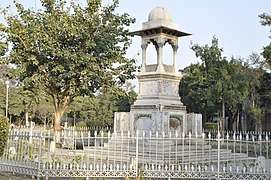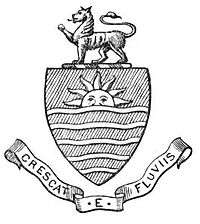James Broadwood Lyall
Sir James Broadwood Lyall GCIE KCSI (1838 – 4 December 1916) was a British administrator in the Indian Civil Service during the British Raj.
James Broadwood Lyall GCIE KCSI | |
|---|---|
 Sir James Broadwood Lyall monument in Faisalabad, Pakistan | |
| Born | c. 1838 |
| Died | 4 December 1916 (aged 77–78) |
| Nationality | British Indian |
| Years active | 1857–1898 |
| Known for | Indian Civil Service |
Biography
James Lyall was born in 1838.[1] He was a son of Alfred Lyall and Mary Drummond.[2] His elder brother was Alfred Comyn Lyall, and his paternal uncles included a Dean of Canterbury, William Rowe Lyall, and a chairman of the British East India Company, George Lyall.[3] He was educated first at Eton College and then at Haileybury College.[1]
He joined the Bengal Civil Service in 1857, arriving in India the following year. He served with the Punjab commission until the end of 1859 and went on to serve as the financial commissioner of the Punjab.[1] He was the first vice-chancellor of the University of the Punjab, a post to which he was appointed in October 1882.[4]
Between 1883 and 1887, Lyall served in southern India as the Resident in Mysore and Chief Commissioner of Coorg.[1] Between 1887 and 1892, Lyall was Lieutenant Governor of the Punjab.[1] He was appointed as a Knight Commander of the Order of the Star of India in 1888.[5]
While Lieutenant-Governor, Lyall helped to found and develop many of the Canal colonies throughout the Punjab, an ambitious plan to harness the rivers of the region and transform 6,000,000 acres (2,400,000 ha) of desert into agricultural land.[6] He was also instrumental in establishing one of the first planned cities in British India, which was named Lyallpur in his honour and is now Faisalabad.[7][8]
Lyall was appointed as Knight Grand Commander of the Indian Empire in May 1892, after ending his tenure in the Punjab.[9] In 1893, he was appointed to the Royal Commission on Opium, which he thought was an official attempt to procrastinate in order to silence opposition to opium use and its trade. Lyall believed there was nothing untoward about moderate use of opium.[1] In 1898, he served as President of the Indian Famine Commission.[1]
He died on 4 December 1916 in Eastry, Kent and is buried in the local churchyard.
Publications
Lyall contributed a chapter on the Punjab to The British Empire series, published in 1899.[10]
References
- Winther, Paul C. (2003). Anglo-European Science and the Rhetoric of Empire: Malaria, Opium, and British Rule in India, 1756-1895. Lexington Books. pp. 135–137.
- "Lyall, Sir Alfred Comyn James". Oxford Dictionary of National Biography (online ed.). Oxford University Press. doi:10.1093/ref:odnb/34641. (Subscription or UK public library membership required.)
- Mittal, Satish Chandra (1995). India Distorted: A Study of British Historians on India. 2. M.D. Publications. p. 285. ISBN 978-8-17533-018-4.
- "University of the Punjab - Former Vice Chancellors". University of the Punjab. Archived from the original on 6 July 2016. Retrieved 8 February 2018.
- "No. 9948". The Edinburgh Gazette. 5 June 1888. p. 574.
- Talbot, Ian A. (2007). "Punjab Under Colonialism: Order and Transformation in British India" (PDF). Journal of Punjab Studies. 14 (1): 3–10. Archived (PDF) from the original on 9 February 2018.
- "Brief History of Faisalabad". District Court of Faisalabad. Archived from the original on 9 July 2017. Retrieved 8 February 2018.
- "The City Faisalabad". Government College University Faisalabad. Archived from the original on 19 June 2016. Retrieved 8 February 2018.
- "No. 10365". The Edinburgh Gazette. 27 May 1892. p. 678.
- "The Punjab". The British Empire Series. 1. Kegan Paul, Trench, Trübner & Company, Limited. 1899. p. 202.
External links
- "Afghanistan 1878-1880: Sources in the India Office Records". British Library. Retrieved 22 November 2011. (Preserved Lyall papers in the records of the India Office.)
